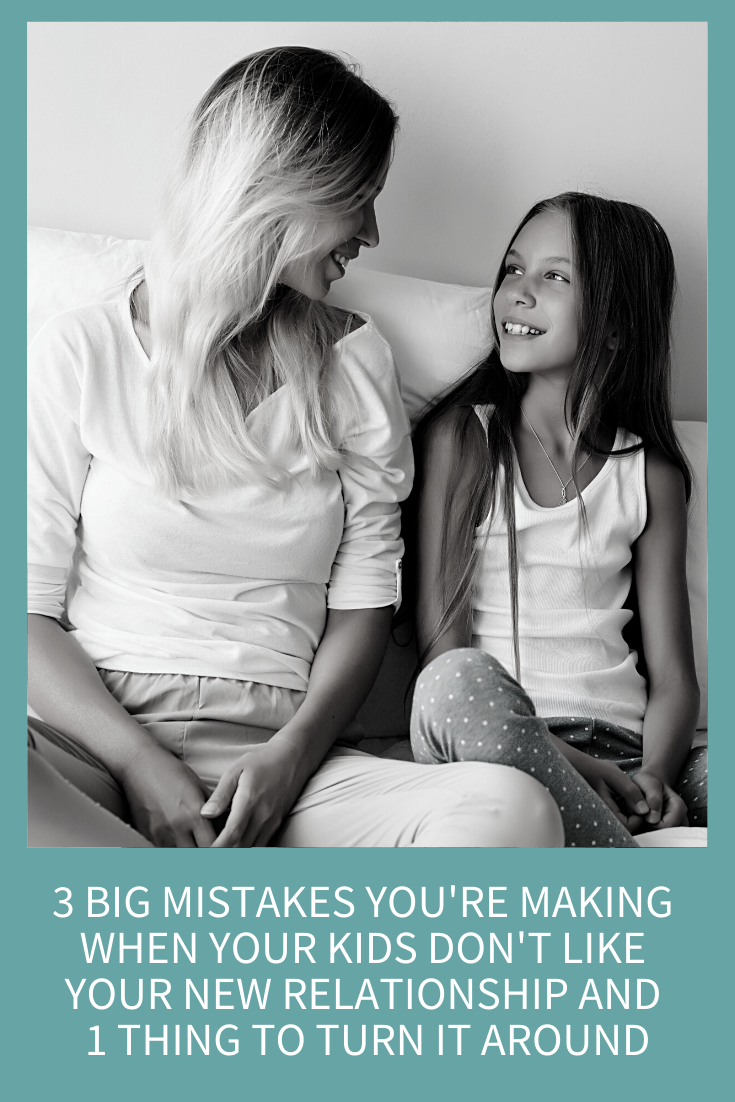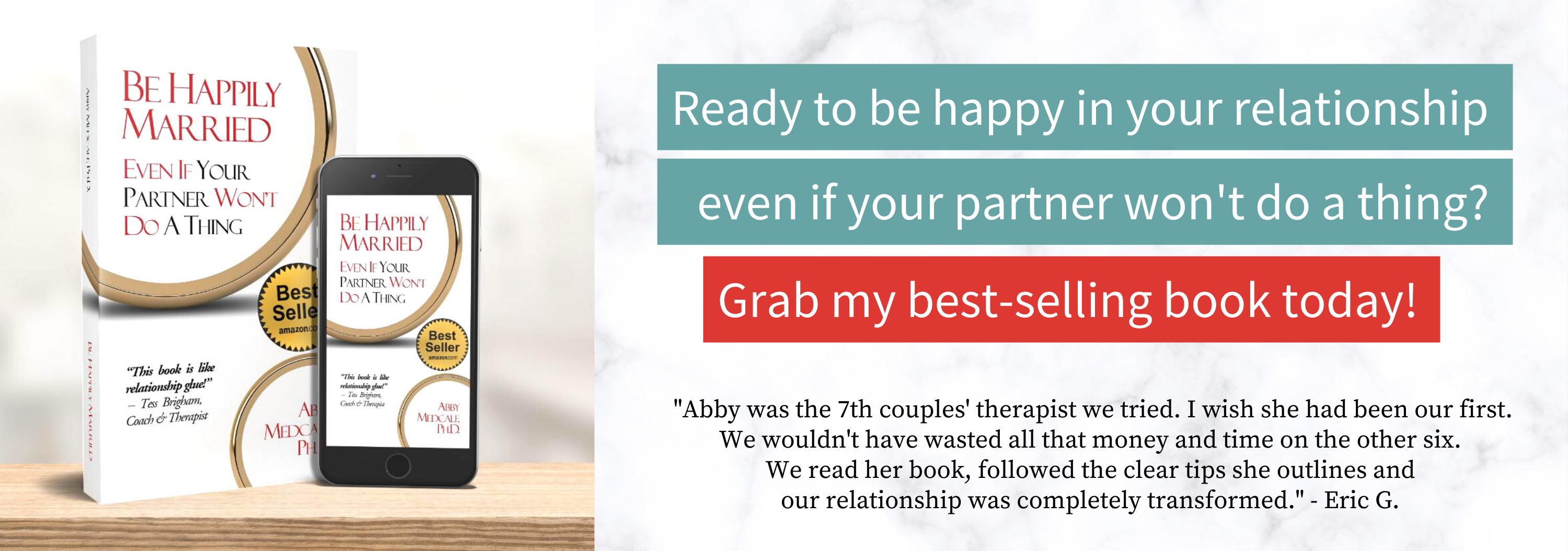
What do you do if your kids don’t like your new partner or if your partner’s kids don’t like you? Today I’m coming at you with the 3 big mistakes you’re making when your kids don’t like your new relationship and the one thing you can do to have effective conversations with your kids (or theirs) so you can start living in love and peace.
8-minute read
Prefer to listen to the podcast? Click here!
The Three Big Mistakes You’re Making When Your Kids Don’t Like Your New Relationship
Mistake #1: You’re Not Really Listening to Your Kids
You think you’re listening, but you’re not really listening. You might even say something that you think is connecting and empathetic like, “I hear that this is hard for you but I love you and I’m here if you need anything.” While that’s a lovely thing to say on some level, it does nothing to really further the conversation and get to the root of what’s happening. There’s a try at saying “I hear you” but then there’s a “but” or there’s just no way to really move forward so your child ends up not feeling heard or listened to, which ups their anxiety and resolve to not like your new relationship or you.
You’re not really listening because you’ve decided this relationship is wonderful, you’re in love and even if they’re making good points, you’re dismissing them because you’re afraid of allowing anything else in (which bring us to mistake #2).
Mistake #2: You’re Coming from Fear, Not Love
You’re coming from fear and the kids can sense that so that has them worried too. Maybe you have your own doubts about the relationship or are worried that your relationship won’t be able to move forward if the kids stay upset. Maybe you’re trying to get the kids on board in a variety of ways and they feel that subtle manipulation and trying to be controlled (which they’ll resist). When there’s a separation kids have no control and their whole world is rocked. Now here you come with this new person and they’re feeling even more out of control and left in the dust.
Mistake #3: You’re Focused on Your Pace, Not Theirs
This is the biggest mistake I see: you’ve fallen in love with this new person. It feels so good and even like such a huge relief after your split with your ex. Yeah! You’ve got all the feels! Whether you wait awhile to introduce kids to a new relationship or start meeting everyone maybe too quickly, you’re missing a big piece.
The kids are not where you are! You’re moving at a certain momentum but your kids are at their own momentum! One of my spiritual teachers explains it this way: Have you even seen one of those little carousels in a park? Not the ones with the horses, but these smaller round metal things with a bunch of handles? I used to love these myself when I was young. You’d hold on and run alongside it until you got that thing going really fast and then you’d jump on and start spinning around. Now, if another kid tried to jump on with it going really fast, they’d often have a lot of trouble (I even remember having some serious bumps and bruises trying to do this when I was young). What you need to do is wait until the carousel slows down enough so you can start running along beside it and then (and only then) you can jump on.
So back to your situations…you’re spinning really fast on your love disk. You’re so happy and in love, but your kids aren’t at the same momentum you are. You’ve got to slow down a bit to where they are and then gradually speed up again with everyone on board.
Dr. Constance Ahrons conducted a 20-year study of children of divorce and found that most kids find their parents’ dating behaviors strange and confusing. Kids under age ten often feel angry or sad and possessive of their parents while teenagers find open affection disconcerting.
So, while you’re flying on the wings of love, they’re looking at your relationship from a completely different vantage point.
So, how do you turn this all around?
You have to have different conversations from a whole new place when your kids don’t like your new relationship. Start really listening and asking the right questions. There’s a way to set yourself up for success.
Here’s my five-step process for effective conversations with your kids:
Step 1: Set Intentions Out Loud
Any conversation you want to have with your kid(s) about your new relationship should start with your intentions.
If you end up in a conversation driving in the car and weren’t expecting it, it’s great to say your intention out loud as soon as you notice any defensiveness or shutting down. If you plan the conversation, start it with your intentions.
Some examples are:
- It’s my intention to listen with an open heart to everything you say.
- It’s my intention to think about how much I love you and how much I want to understand your point of view.
- It’s my intention that we’ll both walk away from this conversation feeling connected and heard.
- It’s my intention that we’re going to have an even better relationship after this conversation.
Setting intention puts everyone in the right frame of mind and will program the RAS to look for good things. It’ll help you all stay focused and mindful during the conversation.
Stating your intentions helps everyone involved feel safer and more connected. If you do nothing else, do this step: it’s a game-changer!
Step 2: Be Curious
Actively think of being curious during this conversation. You really want to understand where the kids are coming from and why they feel the way they do about your new relationship or your new partner. So, listen like you’re wrong and be in a mode of seeking to understand (as opposed to being understood).
Your inside voice should sound something like: “I wonder why they’re having this reaction? I need to figure that out. What’s really going on here?”
Remind yourself why you’re listening:
- It’s because you love and care about your child (or your partner’s child) and want to find a resolution.
- It’s because it’ll improve everything if you can find a way to hear what they’re saying so you can create solutions
Listening without getting defensive or hurt is your goal in all this. Again, don’t just say, “I hear you but…” Really be curious. Maybe they’re even seeing something you don’t. Maybe your love is blinding you to something. You’ve got to get to what they’re thinking under what they’re feeling.
Clearly, they see this person as some sort of threat. But a threat to what? Do they feel lost in the shuffle? Is this very new after the separation from their other parent? Is it possible you are rushing into things? Are they no longer feeling like a priority? Do they believe they have to choose between this person and their other parent?
When you’re curious it gets you out of trying to convince them of something (fear-based) and keeps you in that open, love-based frame of mind.
Step 3: Ask Collaborative Questions
As I mentioned in the mistakes, you likely haven’t really been listening to what the kids are saying about your relationship. Do you go into any of these conversations with your kids with a sense of open curiosity? Are you listening like you’re wrong?
One of the things to do when your kids are complaining about your new partner or have rejected them in some way is to ask some open-ended, collaborative questions such as these:
- Could you tell me more about what’s bothering you about X?
- What else would you like to know about X? (this could be a particular situation they’re resisting or the person themselves)
- If you have a history of some unhealthy relationship choices, you might ask, “What does X remind you of?”
- If there was one thing I could say right now to help us figure this out, what would it be?
- If there was one thing I could do right now to help us figure this out, what would it be?
- What would you like to know about X?
Remember that your kid (or theirs) is likely feeling a sense of loss of control. So, you can ask questions that seek to give them more of a sense of control such as:
- What are you comfortable calling this new person?
- We always come out and greet anyone who comes to our home and I’ve noticed you stay in your room when X comes over. How would you like to greet them?
I’m realizing that you don’t really know X at all so how would you like to get to know them? What’s a first, small step you’d be comfortable with?
Collaborative questions are key when you find that your kids don’t like your new relationship.
Step 4: Ask Clarifying Questions
It’s important to remember that your kids’ complaint, comments or feedback is about what they need, not what you need. Listen for what they need, which isn’t always what they’re asking for. Ask clarifying questions to try to really understand what’s being said.
You can clarify what they said with the ever-popular (and effective): “What I heard you say is X.” You can also get more information by asking, “Can you tell me more about X?” “Can you give me an example of X so I better understand what you mean?”
Remember not to SAC. Ask questions meant to gather more information, not ones disguised as suggestions.
Step 5: Encourage Them to Ask Questions.
This can be a tricky area because you want to keep your boundaries (there are certain things that are none of their business) but you want to encourage an open conversation, which means both of you asking questions and being curious.
- If you have any questions about X, I’d love to hear them
- If there was one burning question you have, what would it be?
- If there’s one thing you really need to know, what is it?
- If there’s one thing you really want to ask, but have been afraid of my reaction, what is it?
Resources
Developing Empathy in Relationships is the Key to Connection and Communication
The Complete Guide to Effective Communication in Any Relationship
If You Want to Communicate, You’ve Got to Listen First
How to Listen without Getting Defensive or Hurt
Research
Constance Ahrons, We’re Still Family: What Grown Children Have to Say About Their Parents’ Divorce







